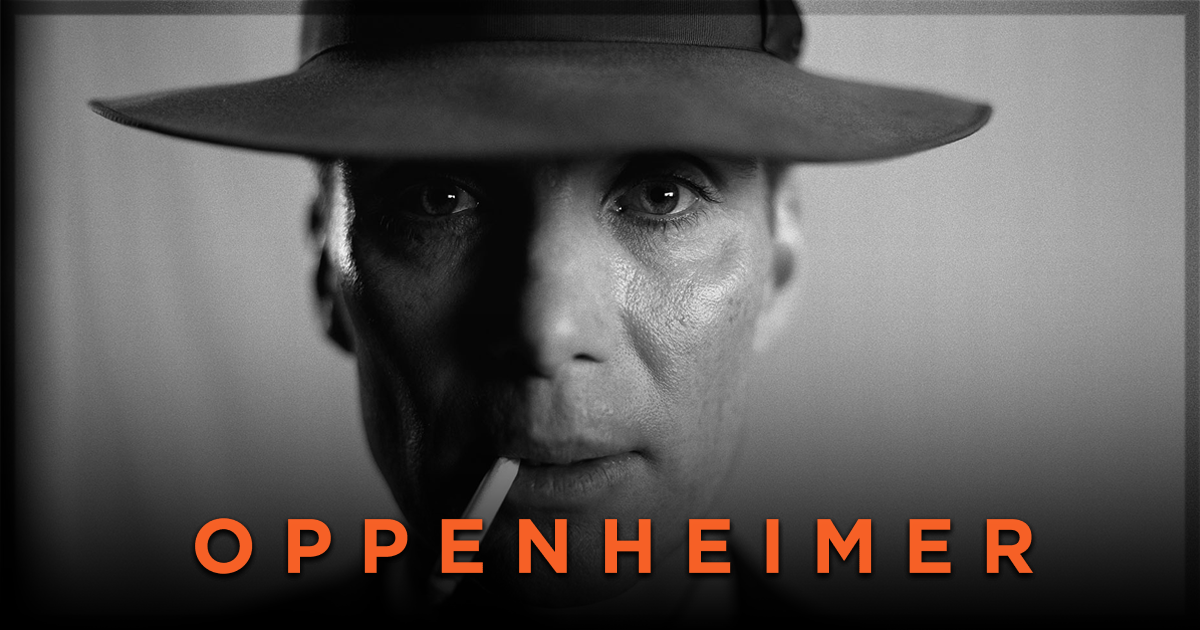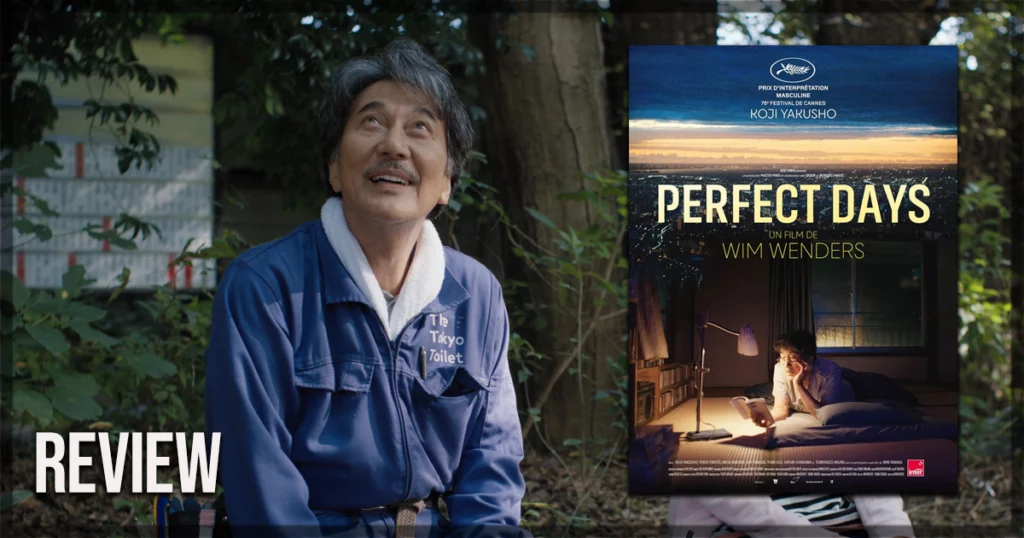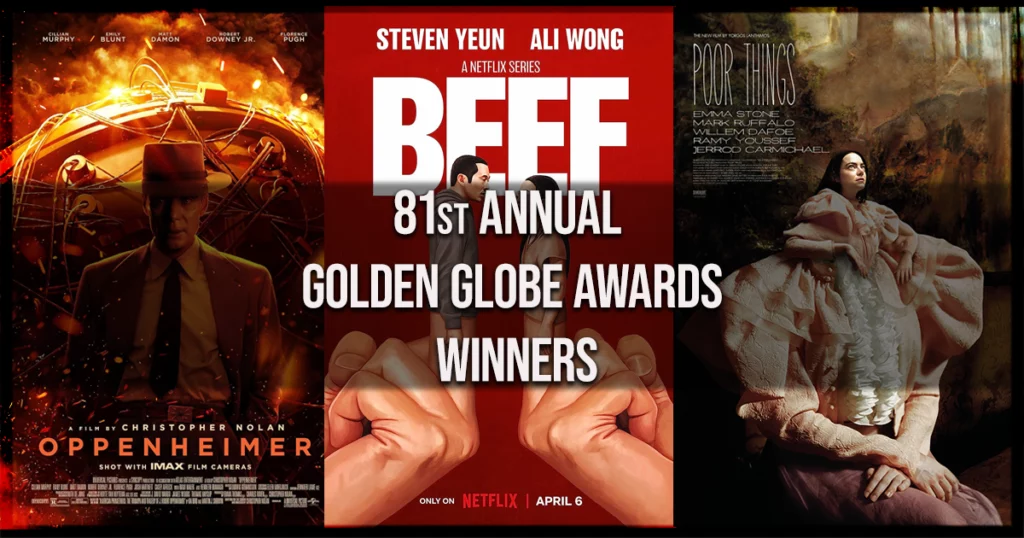J. Robert Oppenheimer (Cillian Murphy) is the focal point of the new film Oppenheimer from writer and director Christopher Nolan. It is the story of the top mind behind the Manhattan Project, known as “the father of the atomic bomb.” Most everyone knows the Manhattan Project was an operation the United States undertook in the early 1940s for the development and creation of the first atomic bomb. But unless you really took the time to study the project, you probably don’t know that the bomb wasn’t developed in Manhattan but instead in a small town that was built in rural New Mexico to operate as the headquarters for some of the top physicists and scientists in the country to work on it. Oppenheimer was one of them.
Oppenheimer follows his life, from his early days and career for the government developing the bombs that would eventually fall on the cities of Japan to how the government eventually turned its back on the man whose work changed the course of world history. Nolan’s direction is nothing short of incredible; his control over so many aspects of this film is evident, and the technicals are working at exceedingly high levels of cinematic expertise.
There are many players in this governmental game of chess, and it can be tough to follow at times, but this film has some of the best single scenes of any film this year. So get a head start on your Oscar’s Best Picture watching and check out Oppenheimer in IMAX if possible; it’s a blast, pun intended.
The story of Oppenheimer
There are spoilers ahead for the movie Oppenheimer.
As the film opens, we watch J. Robert Oppenheimer (Cillian Murphy) stare at a puddle in the rain, the tiny droplets creating waves in the water, the ripples bouncing off one another. His gaze lengthens, then some quick edits depicting waves of fire, smoke, and finally a massive explosion with sparks everywhere appear with the words “Prometheus stole fire from the gods and gave it to man,” followed by “For this, he was chained to a rock and tortured for eternity.”
We cut to a second timeline and see an aged Oppenheimer sitting in front of a three-person security clearance committee in a small government room that looks like nothing more than an office; he reads a statement into the record. One of the three men states, “We’re not judges, doctor.” Then, as Oppenheimer explains, their indictment of him can only be explained by giving them a rundown of his life and work.
The scene cuts, and we’re sped into the future even further. This third timeline is clear because it utilizes the black and white camera Nolan had created for the film. We meet Lewis Strauss (Robert Downey Jr.), a head honcho of the AEC, (Atomic Energy Commission). He’s being interviewed as he’s been nominated to be Secretary Of Commerce. But after just a minute of Lewis speaking, we’re back on the second timeline with Oppenheimer in front of the committee, starting to explain things from the beginning of his time in college.
We see a long-haired Robert lying in bed. As he stares up, we see more quick edits of what we assume to be atoms floating, like stars in a sea of black, then circling at incredible speeds while the sound design fills our ears with noise like a wildfire, only sped up by ten. As the main storyline of his early career continues, Robert meets different scientists in his field, too many to recount here, including Albert Einstein, and we continue to get moments of the speeding atoms and waves of light woven into our story.
Also woven into the story, we’re intermittently taken into the future, the second and third timelines, which does create quite a bit of confusion upon initial viewing, but finally, in the main story, Robert meets a love interest at a party, Jean Tatlock (Florence Pugh) and they hit it off.
Nolan lets this movie breathe
If you haven’t yet guessed, this three-hour movie is packed with information, and while it doesn’t wear out its welcome necessarily, Nolan certainly takes whatever time he deems necessary to tell us the whole story he wants to tell. As Oppenheimer rises to fame and notoriety in the academic world, eventually, Germany invades Poland. Leslie Groves (Matt Damon) recruits him to help the U.S. government in its quest to beat the Germans in a race to create an atomic explosive device.
Eventually, Oppenheimer meets the lovely Kitty (Emily Blunt), who he eventually knocks up (insert crude explosive joke). He’s forced to end things with his old flame, Jean. As things progress with the bomb, the weight of everything that’s riding on his ability to create the device, the devastation they’re able to cause, and the implications of stepping into a world where countries are now armed with nuclear weapons all begin to come into focus.
The gravity of the situation and the countdown of the first Trinity test, as it’s called, go off with spectacular cinematic success. Although the third act does scale back down into the story of how Oppenheimer changes his tune on the devices that he helped create, becomes mostly opposed to the use of nuclear weapons, and finally, how he is vilified and outcast by his own government, to those unfamiliar the story is still mostly engaging.
The pacing revs down quite a bit, but the force of this film cannot be stopped. It can be felt in every atom of your being as the cinematic moments sweep you up and carry you off in what is nothing short of an incredible turning point in the history of humanity.
Oppenheimer features wondrous technical achievements
This film’s technical achievements are simply wondrous and are working double time to easily bring this film close to masterpiece territory straight out of the gate. As I’ve explained, Nolan’s screenplay is intricately woven but also non-linear. Like a Memento type of story, we are cutting forwards and backward through time as we get pieces of the puzzle of who Oppenheimer was, what he accomplished, and who orchestrated his ousting from the inner governmental circles. This type of storytelling is designed quite intentionally for the thinking man – however, some audiences, especially with just one viewing, will be hard-pressed to keep track of everything going on.
But Nolan’s direction is spot on. Despite some of the confusion present in the story, you feel his control as he crafts these moments of impact with the same precision and expertise as the scientists we see putting together this nuclear device. The IMAX camera work and cinematography are both stunning. One shot in particular of Oppenheimer walking through the New Mexico desert town with light snowfall in the winter months was like something out of a gorgeous dream.
Also highly impressive was the original score by Ludwig Göransson, a simply amazing piece of work with expertly woven booms woven into an almost silence; it immediately tops my favorite scores of the year. If this man doesn’t walk away with an Oscar statue, I’ll be surprised. The production design and costumes, while not as flashy as, say, Barbie, are both excellent work and deserve to be mentioned in their own right. Finally, I’ll mention the work of this cast.
While not playing a highly flashy character with a bunch of tense emotional scenes, Murphy is doing some really impressive work as his smoldering eyes conceal the depth of this character’s inner processes. Robert Downey Jr. and Emily Blunt performed excellently, and even Matt Damon put on a good show, although I did like him better in Air earlier in 2023. If I were a betting man, I’d place more than a few dollars that if this film doesn’t lead in total overall Oscar nominations, it’ll certainly be among the most nominated films of the 2023 year, and this film has real Best Picture potential.
Final thoughts on Oppenheimer
Some of the movie moments that come together onscreen have so much impact; well, it’s like getting hit with a bomb. Even with a three-hour runtime, all audiences, both the average moviegoers and critics alike, will sit in awe as the tale of J. Robert Oppenheimer fuses together and blows them away.
Oppenheimer is now streaming.
There are also limited IMAX theatrical showings of the film still playing. Learn more by visiting the movie’s website.
Have you watched Oppenheimer yet? What did you think? Does it deserve all the awards chatter? Connect with us on X @MoviesWeTexted or leave a comment below to share your thoughts.



